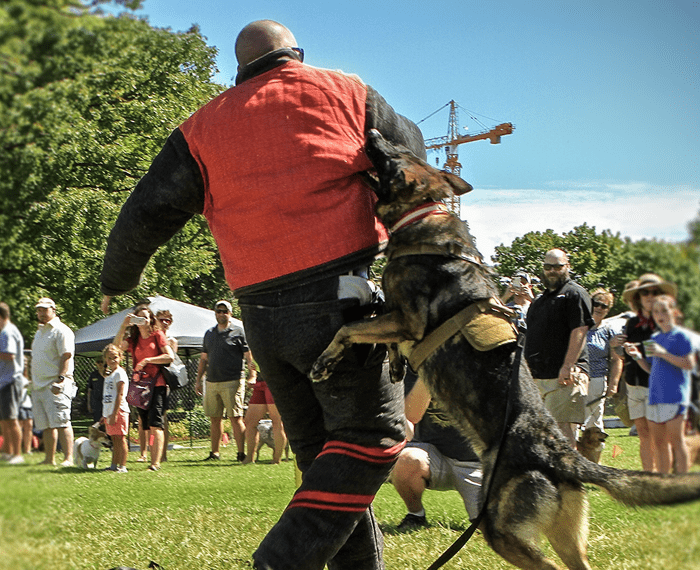Essential Pet Dog Educating Strategies for a Lifetime of Excellent Habits
Efficient pet training is foundational to promoting a mannerly companion that enriches our lives. Necessary techniques, such as positive reinforcement and regular command training, not just boost obedience yet likewise enhance the bond in between owner and family pet. Comprehending canine behavior and employing socialization techniques can avoid possible concerns prior to they occur. However, the trip does not end with standard commands; attending to behavior obstacles requires a nuanced approach that several forget. What are the essential components that can transform your training experience and make certain long lasting outcomes?
Recognizing Canine Habits

Moreover, recognizing the natural instincts and drives of a pet dog-- such as victim drive, social interactions, and territorial habits-- allows trainers to anticipate and manage certain actions. For circumstances, a pet dog with a strong prey drive may require various techniques than one that is much more socially inclined.
Furthermore, early socializing and direct exposure to different environments considerably influence a dog's behavior and personality. Favorable experiences during crucial developing durations can result in well-adjusted adult canines, whereas negative experiences might lead to anxiety or aggressiveness.
Positive Support Methods
Among the various pet training methods, positive support methods stand apart for their efficiency and ability to enhance the bond between pet dog and trainer (Ohana K9 Academy). This strategy highlights gratifying desired habits rather than penalizing undesirable ones, promoting an extra cooperative and trusting partnership
Positive reinforcement can take several kinds, including treats, appreciation, toys, or playtime. The key is to offer instant incentives when the pet shows the preferred behavior, permitting them to make the link in between the activity and the favorable outcome. If a pet rests on command, providing a treat right away strengthens that habits, making it extra most likely to be repeated.
Uniformity is crucial in favorable support training. Instructors need to use the same cues and rewards to stay clear of perplexing the pet. Furthermore, varying the incentives can preserve the canine's interest go to this site and motivation, transitioning from constant deals with to occasional praise or play as the dog masters the behavior.

Standard Command Training
Building on the foundation developed through favorable support approaches, standard command training acts as a critical action in developing a well-mannered pet dog. This training commonly encompasses vital commands such as "rest," "stay," "come," and "down - Ohana K9 Academy." Each command plays an essential role in fostering efficient interaction in between the canine and its proprietor, boosting the general bond
Start with brief, focused sessions lasting no more than 5 to 10 mins to keep your pet's attention. Use high-value deals with as incentives, ensuring the canine connects proper actions with positive outcomes.
Perseverance is critical; pets might need various repetitions to grasp commands completely. Regular practice enhances found out commands, browse around these guys solidifying them in your canine's behavior arsenal.
Socializing Methods
In the realm of dog training, socializing methods are vital for cultivating a well-adjusted and certain canine buddy. Effective socialization includes exposing your pet to a range of environments, individuals, and other pets in a controlled and favorable way. The primary purpose is to assist your dog create a comfort degree with varied experiences, which can substantially decrease anxiety and anxiousness in unfamiliar scenarios.
Begin socialization throughout the important developmental window of 3 to 14 weeks, when young puppies are most receptive to brand-new experiences. Present your pet dog to different settings, such as parks, city locations, and homes with other pet dogs. Guarantee these experiences are positive by utilizing treats and praise to enhance excellent behavior.
Team training courses are an outstanding means to expose your pet dog to other pet dogs and people in an organized setting. This allows for monitored communications, assisting your pet learn proper social cues. Routine getaways and playdates with courteous pets can better enhance social skills.
Addressing Behavioral Problems
Addressing behavioral concerns in canines is a critical facet of training that needs an organized technique and understanding of canine actions. Common issues such as barking, eating, aggressiveness, and anxiety can stem from different aspects, consisting of absence of socializing, insufficient exercise, or also medical worries.

Additionally, establishing an organized routine that includes normal workout and psychological stimulation can considerably reduce behavioral problems. Interactive toys can keep a canine engaged and lower devastating propensities. In situations of severe pop over to this site aggressiveness or anxiousness, speaking with a professional dog instructor or a veterinary behaviorist might be required.
Conclusion
In final thought, efficient dog training methods, including positive reinforcement, fundamental command training, and socialization, are essential for fostering great habits throughout a pet's life. Attending to behavioral problems with an organized approach not just boosts obedience yet also strengthens the bond between canines and their owners.